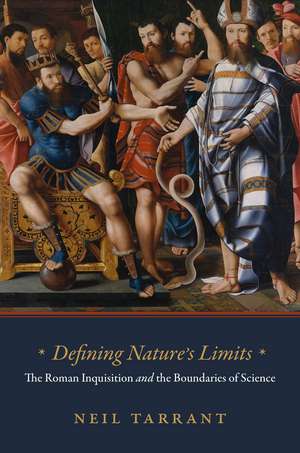Defining Nature's Limits: The Roman Inquisition and the Boundaries of Science
Autor Neil Tarranten Limba Engleză Hardback – 30 ian 2023
Neil Tarrant challenges conventional thinking by looking at the longer history of censorship, considering a five-hundred-year continuity of goals and methods stretching from the late eleventh century to well into the sixteenth.
Unlike earlier studies, Defining Nature’s Limits engages the history of both learned and popular magic. Tarrant explains how the church developed a program that sought to codify what was proper belief through confession, inquisition, and punishment and prosecuted what they considered superstition or heresy that stretched beyond the boundaries of religion. These efforts were continued by the Roman Inquisition, established in 1542. Although it was designed primarily to combat Protestantism, from the outset the new institution investigated both practitioners of “illicit” magic and inquiries into natural philosophy, delegitimizing certain practices and thus shaping the development of early modern science. Describing the dynamics of censorship that continued well into the post-Reformation era, Defining Nature's Limits is revisionist history that will interest scholars of the history science, the history of magic, and the history of the church alike.
Preț: 302.65 lei
Nou
Puncte Express: 454
Preț estimativ în valută:
57.92€ • 60.12$ • 48.29£
57.92€ • 60.12$ • 48.29£
Carte disponibilă
Livrare economică 04-18 martie
Livrare express 15-21 februarie pentru 39.75 lei
Preluare comenzi: 021 569.72.76
Specificații
ISBN-13: 9780226819426
ISBN-10: 0226819426
Pagini: 288
Dimensiuni: 152 x 229 x 28 mm
Greutate: 0.56 kg
Ediția:First Edition
Editura: University of Chicago Press
Colecția University of Chicago Press
ISBN-10: 0226819426
Pagini: 288
Dimensiuni: 152 x 229 x 28 mm
Greutate: 0.56 kg
Ediția:First Edition
Editura: University of Chicago Press
Colecția University of Chicago Press
Notă biografică
Neil Tarrant is a research associate in the Centre for Renaissance and Early Modern Studies at the University of York.
Cuprins
Introduction: Magic, Science, and the Counter-Reformation
I. Medieval Foundations
1. The Origins of the Inquisition of Magic
2. The Dominican Order and the Construction of Orthodox Magic
3. The Inquisition of Learned Magic in the Fourteenth Century
II. Mendicant Reform and the Inquisition of Magic
4. The Crisis of Papal Authority and Observant Reform, 1378–1500
5. The Pursuit of Superstition in an Age of Reform, 1500–1517
6. The Reformation: Trent and the Establishment of the Roman Inquisition, 1517–49
7. Between Trent and the Roman Inquisition, 1549–64
Conclusion: The Ambiguities of Censorship in Post-Tridentine Italy
Acknowledgments
Notes
Bibliography
Index
I. Medieval Foundations
1. The Origins of the Inquisition of Magic
2. The Dominican Order and the Construction of Orthodox Magic
3. The Inquisition of Learned Magic in the Fourteenth Century
II. Mendicant Reform and the Inquisition of Magic
4. The Crisis of Papal Authority and Observant Reform, 1378–1500
5. The Pursuit of Superstition in an Age of Reform, 1500–1517
6. The Reformation: Trent and the Establishment of the Roman Inquisition, 1517–49
7. Between Trent and the Roman Inquisition, 1549–64
Conclusion: The Ambiguities of Censorship in Post-Tridentine Italy
Acknowledgments
Notes
Bibliography
Index
Recenzii
“Surveying several centuries and drawing together topics that are commonly treated by distinct historiographies, Tarrant manages a scholarly exploit. . . . An original and compelling introduction to the history of the Inquisition. as well as new perspectives for the study of magic as both an intellectual pursuit and a protean set of practices.”
“In a sweeping analysis that extends across multiple fields of study, Tarrant traces currents of religious reform, inquisitorial processes, and scholastic theology from the late medieval period into the early modern. He offers an important new perspective not just on the history of magic but also on the history of science and of religion across this pivotal period.”
“Defining Nature’s Limits plays an important role in bridging medieval and early modern theological traditions on magic and inquisition.”
“Defining Nature’s Limits provides an invaluable contribution to the field of late medieval and early modern intellectual and cultural history, focusing on magic and science. Tarrant’s scholarship is impeccable, his argument is innovative and wholly original, and the book makes important, corrective contributions to the history of both science and magic. The book is a major contribution that will enrich the fields of premodern science and the occult, religious history, and intellectual history.”
"Tarrant’s book is an important contribution both to the history of science and to the history of magic in the early modern period. In telling the intertwining stories of the intellectual history of Thomist conceptions of magic from the Middle Ages to the seventeenth century and the history of the Roman Inquisition’s persecution of magic in Italy, Tarrant reveals how the censorship of magic re-drew the boundaries of legitimate natural knowledge and thus had a radical impact on the subsequent development of science."
